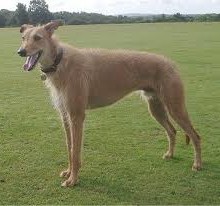Lurcher
Lifestyle Needs

The Lurcher is not a recognised breed but a mixture of breeds. Typically a Lurcher is a combination of a sighthound (often a Greyhound) and another type of working dog, thereby creating a dog with a combination of speed and intelligence. All sorts of combinations are possible in creating a Lurcher: Salukis, Whippets, Border Collies, Retrievers, and different types of Terrier. The Lurcher’s coat will vary depending on the parent breeds. He was once known as something of an outlaw or poacher’s dog but nowadays lives mostly as a companion dog. It is essential that a Lurcher is allowed to run free and ideally should be given frequent opportunities for high energy runs. He is not suited to town life. Typically he is a loveable rogue, smart, sensitive and loving.
Genetic Diversity
(Known as Coefficient of Inbreeding: 'COI'. It should be as low as possible.)
Not applicable.
See 'A Beginners Guide to COI'
Gene Pool Size
(Known as Effective Population Size: 'EPS')
TBC
EPS is a measure of how many individuals are contributing genetically to a breed population. It is a measure of the size of the gene pool in a breed. Lower than 100 is considered critical by conservationists and below 50 brings a breed close to extinction. For more information see the Kennel Club article.
Health and Welfare Problems due to Conformation
(Body shape and physical characteristics)
- Gastric dilation and volvulus (GDV) (Bloat/Torsion) Associated with deep chested breeds.
BVA/KC Health Schemes: www.bva.co.uk/chs
Hip Dysplasia
Elbow Dysplasia
Eye Scheme
Estimated Breeding Values (EBVs) : No EBVs are currently available for this breed
www.thekennelclub.org.uk/about-ebvs
DNA Tests Available
DogWellNet and IPFD Harmonisation of Genetic Testing for Dogs (HGTD)
www.dogwellnet.com/breeds
- Ivermectin sensitivity (MDR1) (Lurchers with Collie ancestry).
Availability of a DNA test does not mean that it is always necessary or even desirable for breeders to use this test.
Other Breed-Specific Health Screening Schemes
None applicable
Ask the breeder to show you the certificates for the above tests/screening for both parents. If any of the above tests have not been considered necessary by the breeder (and there may be good reasons), ask her to explain why.
Other Diseases Reported
(For which there are currently no genetic or screening tests for sire or dam)
- Large Lurchers, especially those including Deerhound as well as Greyhound may have heart problems. Most common is Dilated Cardiomyopathy (DCM)
- Sodium pentothal anaesthetic sensitivity (common in Greyhounds)
- Cancer: Osteosarcoma
Ask the breeder about the medical history of the parents, grandparents and great grandparents. Consider carefully whether to purchase a puppy if some of these or other diseases are in the family line.
Ask about the breeder’s policy in cases of serious genetic diseases occurring to your puppy in later life. Good breeders will request to be informed of such events in order to improve future breeding decisions.
You are strongly advised to buy from a breeder who uses (or is prepared to use) the AWF Puppy Contract and Puppy Information Pack (PIP): www.puppycontract.org.uk
The breeder should also be familiar with the CFSG/DBRG Code of Practice for Dog Breeding